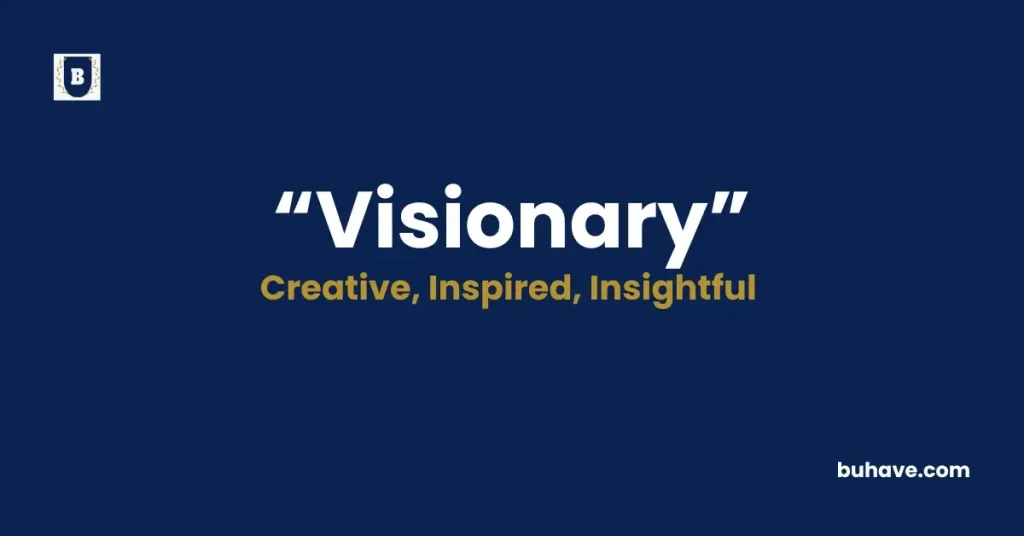The word ‘Visionary’ (Noun) describes someone who has original ideas about what the future could look like or someone who is able to think creatively and plan for what’s coming. In this guide, you’ll learn the full definition, synonyms, antonyms, etymology, and real-life examples of how to use ‘Visionary’ correctly in sentences.
Visionary Explained in Depth
A complete and detailed guide to the word “Visionary” including meaning, definition, examples, etymology, synonyms, and antonyms.
Meanings of Visionary
Visionary means having or showing clear ideas about what the future should be like. It can refer to a person who imagines new possibilities or opportunities, often far ahead of their time. It also describes qualities or plans that are innovative, ambitious, and forward-thinking.
A visionary person is usually someone who is imaginative and able to see beyond the current limitations, imagining a better future. It can also be used to describe artistic or spiritual experiences that are dream-like or inspired by powerful visions.
Definition
Visionary is both an adjective and a noun. As an adjective, it means having the ability to imagine or plan the future with creativity and wisdom. As a noun, it refers to a person who sees possibilities that others might miss a dreamer, innovator, or pioneer who shapes new paths in science, art, business, or social change.
Visionaries often have ideas that challenge the status quo and bring new perspectives, inspiring others with their foresight and imagination.
Etymology
The word “visionary” comes from the Latin word “visionarius,” meaning “of seeing or visions.” The root “visio” means “sight,” from the verb “videre,” meaning “to see.” It entered English in the 17th century, initially referring to someone who had mystical or spiritual visions. Over time, its meaning expanded to include people with imaginative ideas about the future—dreamers and innovators who see beyond the present moment and envision new possibilities.
Example Sentences
- She’s a true visionary, always coming up with innovative solutions to complex problems.
- The company’s visionary leadership helped it stay ahead of the competition for decades.
- His visionary art transformed the way people think about modern sculpture.
Visionary Synonyms
- Innovative
- Forward-thinking
- Creative
- Imaginative
- Pioneering
- Futuristic
- Idealistic
- Inventive
- Trailblazing
- Groundbreaking
Visionary Antonyms
- Practical
- Conventional
- Realistic
- Unimaginative
- Down-to-earth
- Traditional
- Ordinary
- Conservative
- Cautious
- Predictable
FAQs about Visionary
Here are some frequently asked questions (FAQs) about the word “Visionary”
1. What does “visionary” actually mean?
“Visionary” describes someone who can see potential in the future and create innovative plans to make that vision a reality. It implies creativity, foresight, and a desire to bring new ideas to life.
2. Can “visionary” refer to a person?
Yes. When used as a noun, it refers to a person who imagines new possibilities and can see beyond current limitations. For example, “Steve Jobs was a visionary in the technology industry.”
3. Is “visionary” always a positive term?
Most of the time, yes—it’s used to describe people who inspire others with their ideas and ambition. However, sometimes it can be used critically, implying that someone’s ideas are unrealistic or too idealistic.
4. Can “visionary” describe art or ideas?
Absolutely. “Visionary art” refers to imaginative or dream-like artworks, while “visionary ideas” describe creative plans for the future that challenge the ordinary and spark change.
5. How is “visionary” different from “innovative”?
“Visionary” focuses on seeing the future with imagination and creativity, while “innovative” emphasizes introducing new methods, products, or ideas. Visionary people often think big-picture, while innovative people bring fresh solutions to practical problems.

















